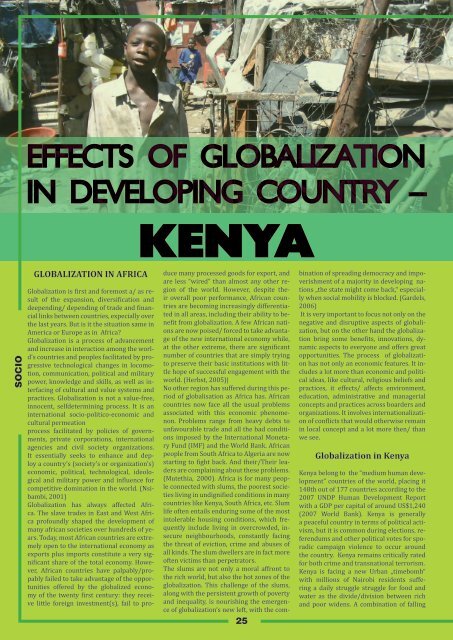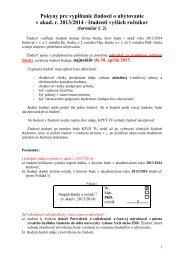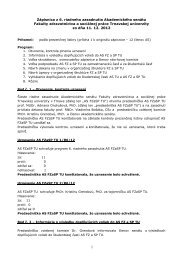EFFECTS OF GLOBALIZATIONIN DEVELOPING COUNTRY –KENYASOCIOGLOBALIZATION IN AFRICA25Globalization is first and foremost a/ as resultof the expansion, diversification anddeepending/ depending of trade and financiallinks between countries, expecially overthe last years. But is it the situation same inAmerica or Europe as in Africa?Globalization is a process of advancementand increase in interaction among the world’scountries and peoples facilitated by progressivetechnological changes in locomotion,communication, political and militarypower, knowledge and skills, as well as interfacingof cultural and value systems andpractices. Globalization is not a value-free,innocent, selfdetermining process. It is aninternational socio-politico-economic andcultural permeationprocess facilitated by policies of governments,private corporations, internationalagencies and civil society organizations.It essentially seeks to enhance and deploya country’s (society’s or organization’s)economic, political, technological, ideologicaland military power and influence forcompetitive domination in the world. (Nsibambi,2001)Globalization has always affected Africa.The slave trades in East and West Africaprofoundly shaped the development ofmany african societies over hundreds of years.Today, most African countries are extremelyopen to the international economy asexports plus imports constitute a very significantshare of the total economy. However,African countries have palpably/propablyfailed to take advantage of the opportunitiesoffered by the globalized economyof the twenty first century: they receivelittle foreign investment(s), fail to producemany processed goods for export, andare less “wired” than almost any other regionof the world. However, despite theiroverall poor performance, African countriesare becoming increasingly differentiatedin all areas, including their ability to benefitfrom globalization. A few African nationsare now poised/ forced to take advantageof the new international economy while,at the other extreme, there are significantnumber of countries that are simply tryingto preserve their basic institutions with littlehope of successful engagement with theworld. (Herbst, 2005)|No other region has suffered during this periodof globalisation as Africa has. Africancountries now face all the usual problemsassociated with this economic phenomenon.Problems range from heavy debts tounfavourable trade and all the bad conditionsimposed by the International MonetaryFund (IMF) and the World Bank. Africanpeople from South Africa to Algeria are nowstarting to fight back. And their/Their leadersare complaining about these problems.(Mutethia, 2000). Africa is for many peopleconnected with slums, the poorest societiesliving in undignified conditions in manycountries like Kenya, South Africa, etc. Slumlife often entails enduring some of the mostintolerable housing conditions, which frequentlyinclude living in overcrowded, insecureneighbourhoods, constantly facingthe threat of eviction, crime and abuses ofall kinds. The slum dwellers are in fact moreoften victims than perpetrators.The slums are not only a moral affront tothe rich world, but also the hot zones of theglobalization. This challenge of the slums,along with the persistent growth of povertyand inequality, is nourishing the emergenceof globalization‘s new left, with the combinationof spreading democracy and impoverishmentof a majority in developing nations„the state might come back,“ especiallywhen social mobility is blocked. (Gardels,2006)It is very important to focus not only on thenegative and disruptive aspects of globalization,but on the other hand the globalizationbring some benefits, innovations, dynamicaspects to everyone and offers greatopportunities. The process of globalizationhas not only an economic features. It includesa lot more than economic and politicalideas, like cultural, religious beliefs andpractices, it effects/ affects environment,education, administrative and managerialconcepts and practices across boarders andorganizations. It involves internationalizationof conflicts that would otherwise remainin local concept and a lot more then/ thanwe see.Globalization in KenyaKenya belong to the “medium human development”countries of the world, placing it148th out of 177 countries according to the2007 UNDP Human Development Reportwith a GDP per capital of around US$1,240(2007 World Bank). Kenya is generallya peaceful country in terms of political activism,but it is common during elections, referendumsand other political votes for sporadiccampaign violence to occur aroundthe country. Kenya remains critically ratedfor both crime and transnational terrorism.Kenya is facing a new Urban „timebomb“with millions of Nairobi residents sufferinga daily struggle struggle for food andwater as the divide/division between richand poor widens. A combination of falling
Positive effects of globalizationNegative effects of globalizationInformation and communiction technologies have increasedinteraction among people and comunities, etc.People are divided between the connected, who know and theisolated, who do not know and who practically have nothingTo share the culture, values, traditions, beliefs, creativity, ideas,etc.Some cultures are diluted and destroyed, negative values arespread, loosing cultural identity,International trade, commerce, foreign investment, flow ofcapital, new rules of local markets etc.Encouraged illicit trade in drugs, prostitution, pornography,human smuggling, dumping of dangerous wast and depletionof the environment, etc.Free labour movements across boundaries, facilitated „bratintrade“Reducing further human capacity, economic and socialstagnation, etc.Global village out of wide and diverse world,etc.Global village of pirvileged people whose borders areimpenetrable to the poor, unconnected and unskilled. Thecitizens of the global village are very few.Reinforcement the position of women, women rights, morepossibilities, tec.Loosing the women identity, change of roleHealth care institutions, HIV/AIDS treatmentLimited Access of poor communities to the equal services, etc.household income, rising prices, and poorgovernance is making life a misery for thepoor majority in Kenya’s capital. Rapid urbanizationis changing the face of povertyin Kenya. Nairobi’s population is set to nearlydouble to almost six million by 2025,and 60% of residents live in slums with noor limited access to even the most basic servicessuch as clean water, sanitation, housing,education and healthcare. Whereasthe starkest poverty has previously beenfound in remote rural areas, within the nextten years half of all poor Kenyans will bein towns and cities. (Taylor – Goodfellow,2009). Is this also impact of globalization?The reach of globalization includes all theparts of the country, savanna in its remotestcorners and activities of daily life. Manyfamilies hold on to the traditional way of lifebut accept and incorporate outside tools,goods, and practices that suit and benefitthe family’s well-being and general security.Poverty and lack of access to the outsideworld play, however, a significant role inthe observed cultural and economic isolation.It is a big challenge of today to be wiseand take good leadership to guide the african(Kenyan)tribes, communities into thenew period, maintaining their culture whilea dapting to the changing world aroundthem.The globalization of African cities hasgrown significantly in the past two decadesin response to domestic and global economic,social, cultural and political forces. Inparticular, the World Bank-IMF’s StructuralAdjustment Programs of the 1980s and1990s played an important role in liberalizingthe economies of many African countriesto the benefit of domestic and globalcapital. As one of Africa’s most global cities,Nairobi has witnessed significant developmentand reinforcement of its global trade,transport, communications, financial, andinvestment linkages since the 1980s due togreater tourist flows to Kenya and the ongoingconcentration of multinational corporations,international NGOs, and UN agenciesin the city. Moreover, the city’s global distributionand consumption (and to some extentproduction) role has benefited fromthe increased emigration of Kenyans to richercountries and the subsequent increasein remittances, continuing regional politicalinstability in East and Central Africa andthe ensuing relocation of wealthy Somalis,Rwandese, & Congolese to the city and, theincreasing role of Nairobi in aspects of theglobal underground economy. Nevertheless,the city’s increased globalization hasheightened its socioeconomic cleavages,with the local and global elite increasinglyretreating to gated residential, office, commercial,and leisure spaces even as the relativedeprivation of average Nairobians hasincreased; raising serious questions aboutcity’s, and indeed Kenya’s, future social andpolitical stability. (Otiso, 2009)The positive and negative sideof globalization in Kenya26The extreme optimists see globalization asa glass three quarters full of opportunities.On the other hand the extreme pessimistssee globalization as a crisscross, full of problems,especially exploitation, socio-economicinjustice and international political domination.Mid-point strategists must seeglobalization as a change process full of opportunitiesand challenges that must be carefullyand skilfully harnessed and managedfor human development. We can saythat globalization has also two sides of thecoin. We try to give some examples of effectsof globalization in Kenya.Globalization of Maasaicommunity in KenyaIn Kenya there are living forty-two traditionalethnic groups which can be broadly dividedinto three groups: the Bantu, Nilotes,and Cushites. These three categories of ethnicgroups are spread all over the country,and no particular group can be tied to oneregion. The regional boundaries do little toseparate the similarity of customs and beliefspossessed by each group, owing to theircommon heritage and contacts over hundredsof years. Special status has the Massaicommunity.One of the most legendary tribe in Kenyaare Maasai people, warriors are the posterpeople of conservative African culture.Most Maasai have resisted colonial and nationalgovernment efforts to integrate intomodern society. The life of rural Maasai hashas been governed by their love for cattle—in the past, present, and perhaps tomorrow.Maasailand straddles the border of Kenyaand Tanzania.The Maasai are a semi-nomadic peoplewho lived under a communal land managementsystem. The movement of livestockis based on seasonal rotation. Contraryto many claims made by outsiders, particularlythe Hardinian school of thought, thiscommunal land management system allowsus to utilize resources in a sustainable manner.Each section manages its own territory.Under normal conditions, reserve pasturesare fallowed and guarded by the warriors.SOCIO
















